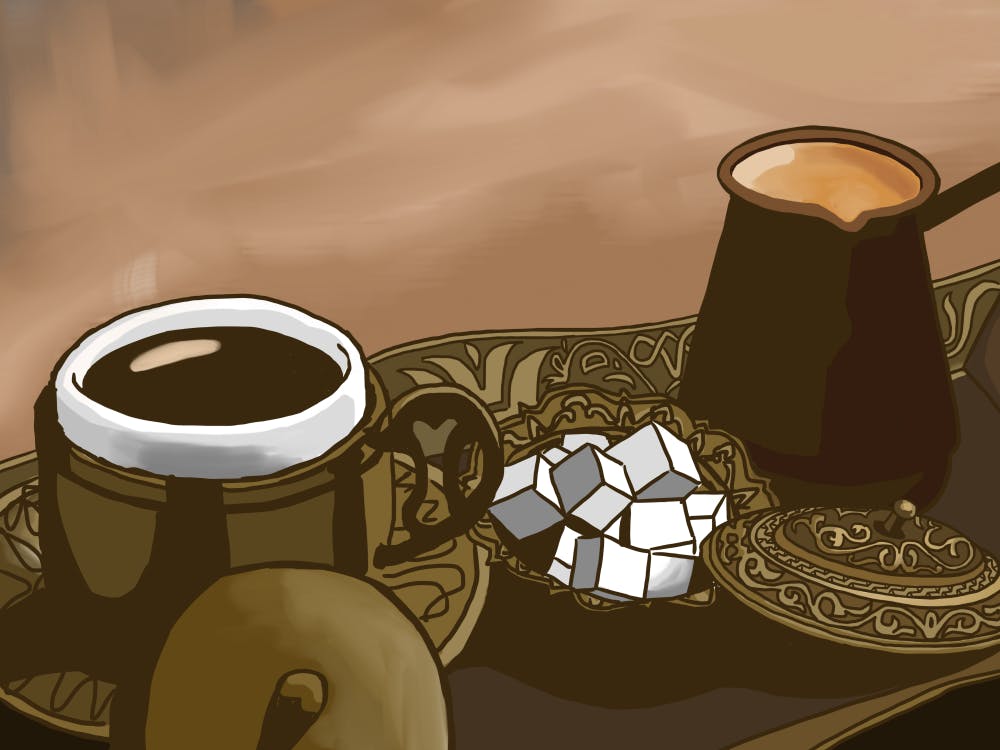While October wind rails against the floor–to–ceiling glass of Harnwell's rooftop lounge, I am warm with a cup of freshly brewed espresso folded in my fingers. Breathing in deep, the scent of coffee grounds fills my nose, complementing the hush of gentle conversation. The clinking of a moka pot breaks my lull, and I savor the last of my espresso, acidic and bitter notes sinking into my tongue. Scanning the circle of booths, I move to the Vietnamese coffee booth, lips already poised to ask for a taste.
Hosted by the Penn Coffee Club and a multitude of cultural groups, including the Penn Brazil Community, Penn Ethiopian Club, and Penn Japan Student Association to name a few, the event was rightly dubbed CaffeiNations—a fitting pun for a borderless nation of college caffeine addicts, each with their own unique cultural take on the beloved drink. Featuring coffee samples and displaying excerpts on the drink's historical or cultural background, each booth was manned by members of a cultural group. The Vietnamese booth offered black coffee with condensed milk, a regional mix–in made popular by Vietnam's lack of a dairy industry. "Kopi Luwak," or coffee brewed from part–digested coffee cherries eaten and defecated by the Asian palm civet, was presented as a novelty drink to braver taste testers. Turkish coffee, thick with finely powdered coffee and sweet with sugar, was poured pipping hot out of a pot into paper cups at the Turkish booth, its aroma rich and enticing. The Japanese booth offered pour overs, capitalizing on Japanese innovation in cold brew and pour over equipment design.
Each sip of the bitter brown drink was a glimpse into a region's culture—the groups that form them, the ties that bind them, and the connections between them. An adoption from Vietnam's colonial past, coffee has become a mainstream social staple tailored to regional climate: coffee drunk during cool misted mornings is never the same as that drunk in the stifling heat of a tropical afternoon. Indonesia's Kopi Luwak speaks of the serendipity that leads native coffee plantation farmers to brew coffee from coffee seeds found in civets' droppings, as a method around Dutch colonizers' restrictions on brewing their own coffee crop. Innovation allowed them to taste the fruits of their labor—literally. The result was an internationally acclaimed drink, one now exported predominantly by Indonesia and known for its unique depth of flavor after fermentation in civets' intestines.
Turkish coffee, famous for its strong aroma, is a drink unlimited to its namesake region, as it has found a following in the Middle East and become rooted in local tradition as well. Culture has no boundaries to speak of, and neither does coffee. Japanese coffee culture is one of silent speed. Not only are coffeeshop visits surprisingly brief, but they are also quiet in atmosphere, without the boisterous chatter or lively banter one might find in American or Italian cafes. Perhaps one can see it as a reflection of their local population—a valuation of humble industriousness.
Regardless of which cultural variation these coffee connoisseurs are more fond of, they all seem to reach a consensus on the iconic drink's role as a conversation starter. A student manning the Japanese booth smiles as he elaborates, "Coffee in its essence is a medium for social interaction. So like, you go get a cup of coffee, not because you want coffee itself but because you want to go talk to that person, spend time with that person, stuff like that. So I think that, it helps people connect a little bit more, and it helps create a reason to be able to spend time with other people."
Staring down at the stack of assorted paper and plastic cups in my left hand, remnants of my previous taste testings, I tip my head back to savor bitter brown dregs out of a cup in my right. Here, coffee and culture intersect to draw out warm chatter. While savoring a steaming cup of espresso, perhaps his fifth or sixth of the day, one member of the Penn Italian Community contemplates, "...we never drink coffee while walking, we rarely drink coffee while working. We always take a break to go drink coffee and we do that with friends and coworkers...It's really a social moment, rather than a drinking moment."







